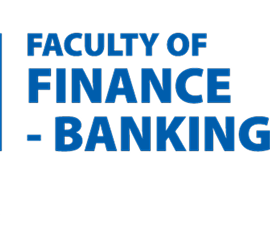Major Code
7340201
Entry Requirement
A00, A01, D01/D03, D09
Educational goals
The Finance-Banking program trains learners with political and ethical qualities, a sense of service to the people, knowledge and professional practice capacity commensurate with their training level, good health, to meet the requirements of national construction and defense. Specifically, the Finance-Banking program demonstrates the following educational objectives:
- Provide students with basic knowledge and financial skills.
- Graduates can apply this knowledge and skills to assist leaders in identifying and assessing a business’s current financial position.
- Apply financial models to determine enterprise value, project value, diversify investment portfolios to maximize profits, limit risks in companies and financial institutions. Develop effective investment strategies and portfolio management processes.
- Implement professional processes in business activities of a modern bank such as: credit granting process, letter of credit opening process, international payment, foreign exchange business, banking administration and other related services, and other types of modern banking services.
- Apply the basic knowledge and social skills suitable to the training major in practice; ability to work independently and in groups; good use of English in work, study and research.
- Students adhere to professional ethical standards when entering the banking and financial sector.
- Ability to study at a higher level.
- The program trains global citizens capable of working both domestically and internationally.
Majors:
The Banking and Finance sector is currently training 2 majors as follows:
- Corporate finance
- Banking
Program Outcomes:
Graduating from the Finance & Banking program (undergraduate level), students achieve output standards that meet training standards set by the American Council for Accreditation of Schools and Business Training Programs (ACBSP accreditation) as follows:
1. Professional attitude and ethics
– Comply with the law, principles and standards in financial investment, be independent, honest and objective when participating in the financial market
– Dynamic, confident, responsible when serving customers and the community.
Able to work independently and in groups.
2. Professional competence
1. Determining the time value of money, valuing stocks, bonds, and other fund certificates. Build and analyze financial statements of the business, analyze cash flows, identify short, medium and long-term funding sources. Appraisal of investment projects with methods: net present value (NPV), internal rate of return (IRR), payback period (PP), index of return (PI)… Determine discount rate, apply uses business valuation models with the discounted cash flow method, economic value added (EVA) method, and others. Building an effective portfolio of many different assets, applying the Markowick model, using derivatives in risk management of enterprises such as futures contracts, contracts forward contract, swap contract, option contract.
2. Understand and implement the appraisal, evaluation and credit granting processes for a wide range of customers including businesses, individuals and other financial institutions, along with other banking products and services. goods such as international payment, card payment, savings, deposit, …
3. Understand financial behaviors that can account for anomalies in financial markets. Develop effective financial management strategies. Understand the choices managers face to decide which deliver the best value and how they are shaped by the company’s key stakeholders including government, society, partners transactions, customers, employees and competitors. Research, make policy and solve professional problems in the field of financial management. Apply modern financial knowledge and skills to assist leaders in identifying and assessing the current financial position of the business
4. Consulting on capital mobilization in the financial market, consulting on mergers and acquisitions, equitization, and listing on the Stock Exchange. Advising investors to make investments on the Vietnamese stock market as well as in the world. Recommend a plan for corporate restructuring.
3. The ability to integrate and learn for life
1. Achieve a minimum English level equivalent to B1 level, use English in work, study and research in the field of finance and banking.
2. Teamwork and leadership skills
3. Performing and organizing work; problem-solving skills, working independently according to assigned tasks; Ability to adapt to a dynamic working environment.
4. Drawing experiences from arising practices to form critical and creative thinking skills
5. Self-study supplementary knowledge of majors to serve their main major at higher education level as well as to have the conditions to switch and hold a high position in the future.
6. Update economic – political – social changes in the current integration and globalization process and apply them in practice after graduation.
4. Career opportunities
Graduates of Banking and Finance can work in the following positions:
- Bank credit specialist;
- Specialist in accounting, internal audit of commercial banks;
- Accountant in international payment department;
- Foreign currency trader, Currency trader;
- Asset and capital management specialist;
- Trade finance specialist;
- Corporate financial analyst;
- Property appraiser;
- Specialist in mergers and acquisitions;
- Lecturer in Banking and Finance;…


